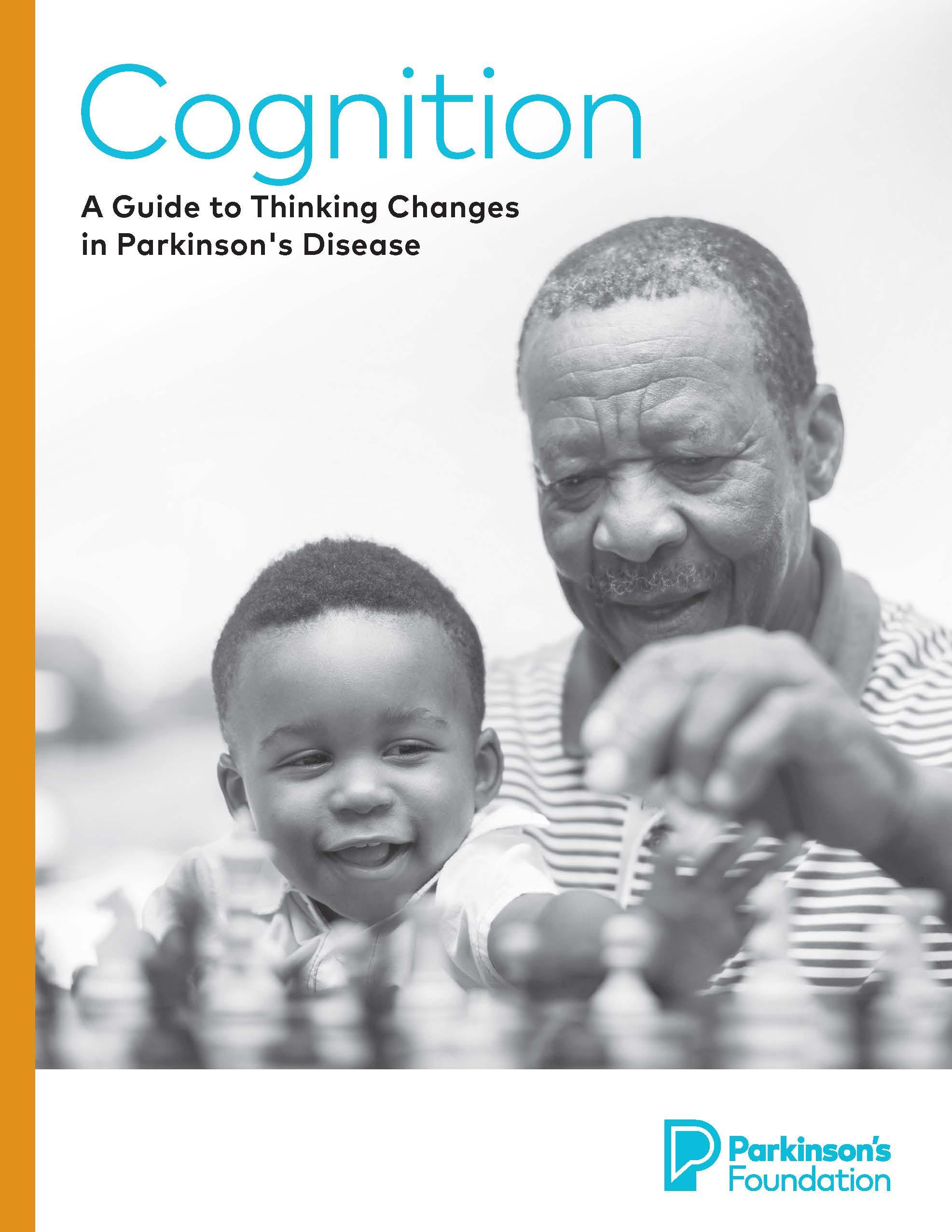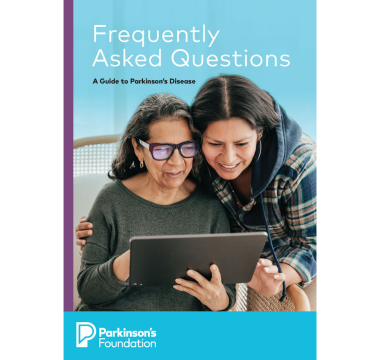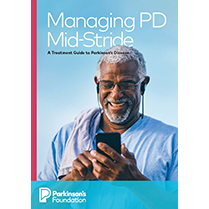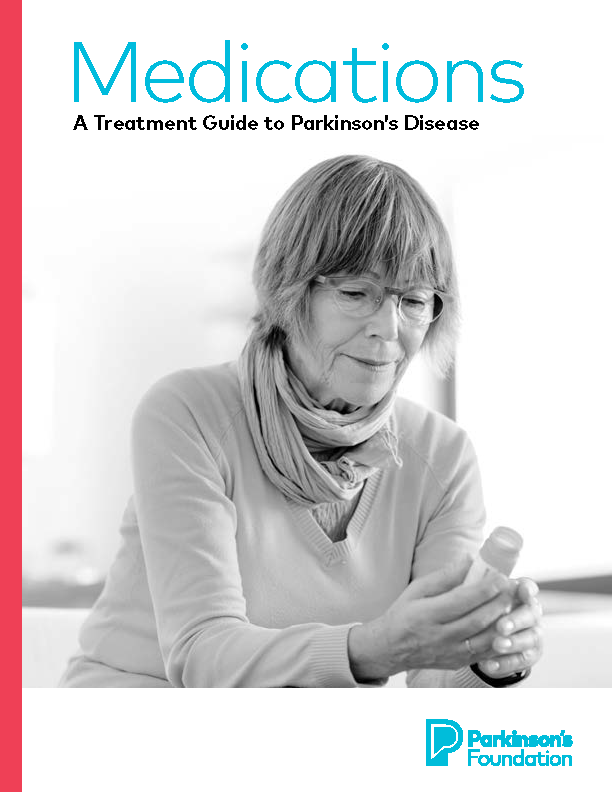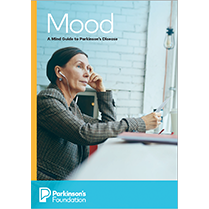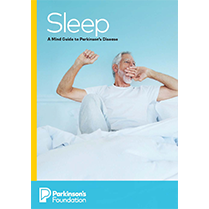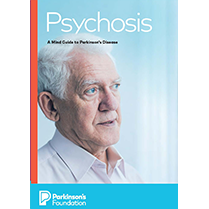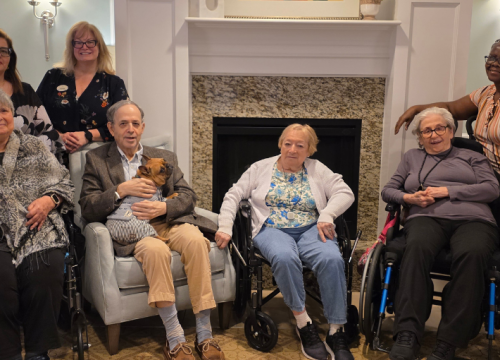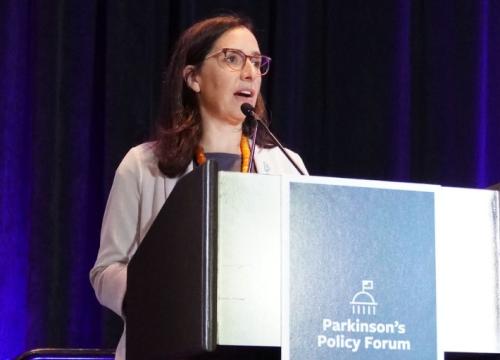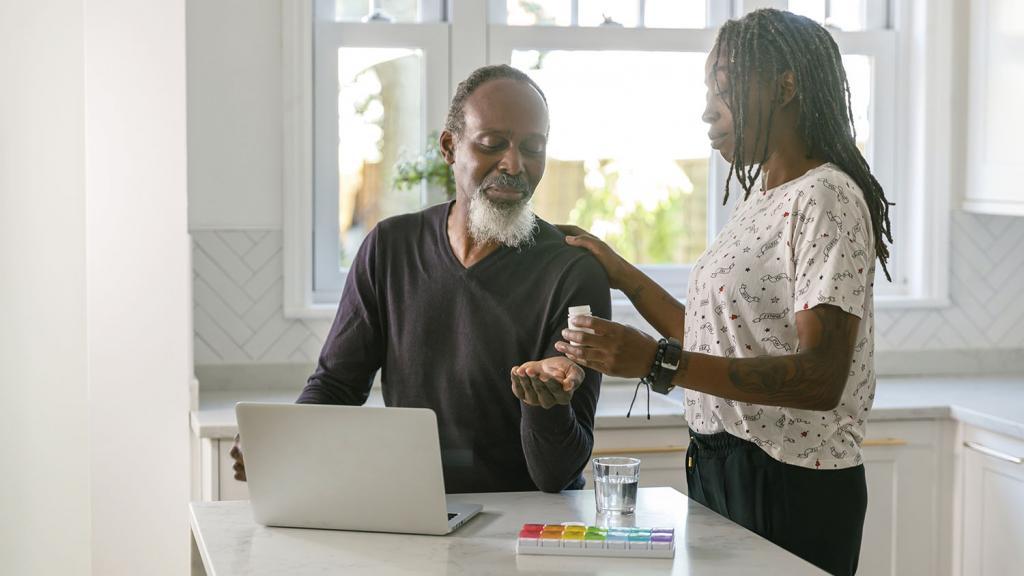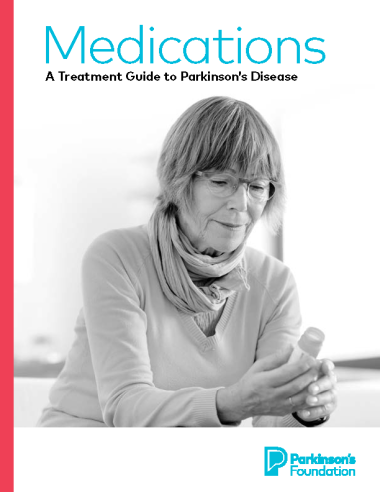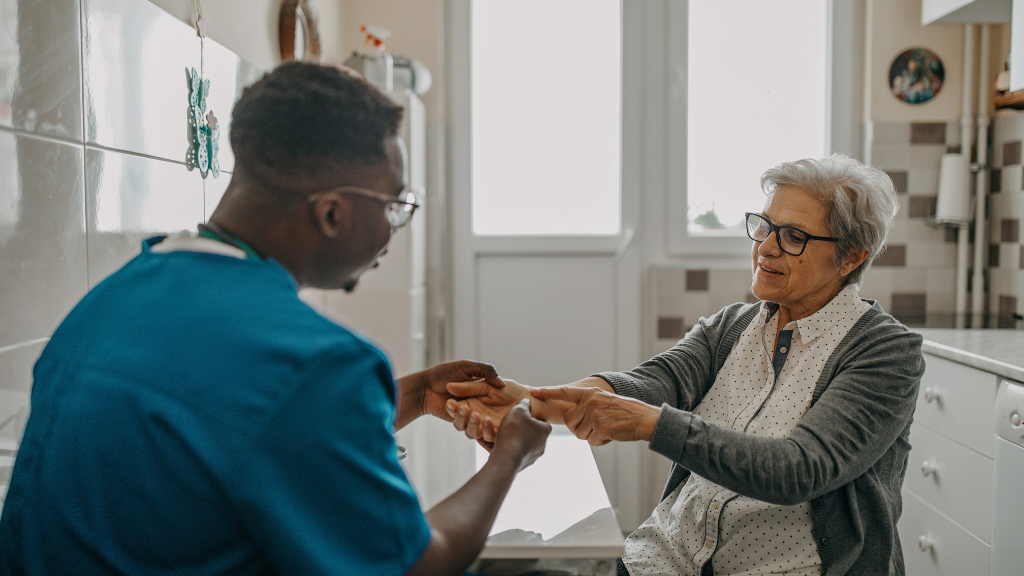Tackling Neuropathy, Fatigue and GI Issues in PD

While it’s known as a movement disorder, people who live with Parkinson’s disease (PD) experience many non-movement, or non-motor, symptoms too – though not all of them are related to the disease. Peripheral neuropathy, or nervous system damage, fatigue and GI issues are common PD challenges that can also stem from other causes. Working with your doctor to identify the source of your symptoms is key to effective treatment.
This article is based on the Parkinson’s Foundation Expert Briefing series; Symptom Management: Is it PD, Medication or Aging? Exploring Non-motor Symptoms: Neuropathy, Fatigue, GI Issues presented by Ellen Walter, Nurse Practitioner, Cleveland Clinic, and Steven Swank, Clinical Pharmacist, University of Kansas Medical Center. Both organizations are Parkinson’s Foundation Centers of Excellence.
Causes of neuropathy, fatigue and impaired gastrointestinal (GI) function during the course of PD can be wide-ranging – and include everything from normal aging to medication side effects.
With any health challenge, it’s recommended to log symptoms. This can help your doctor rule out potential causes. When did symptoms start? Are there any patterns?
Neuropathy
Peripheral neuropathy describes damage to the nerves that carry messages between the brain and spinal cord. Although they may not know it by name, people who live with PD are more likely than others to experience peripheral neuropathy. It can cause pain, numbness, tingling or muscle weakness, or greater sensitivity in certain areas.
This condition can also cause loss of coordination or sometimes make people feel as if they're wearing gloves or socks. Due to increased risk for walking problems and falls, a falls risk assessment is critical for anyone living with Parkinson’s who experiences peripheral neuropathy in their legs.
Possible Causes
While there can be a connection to peripheral neuropathy and Parkinson’s medications, research shows people with PD can have neuropathy even before beginning treatment.
Other types of neuropathy are also more common in PD, including:
- neurogenic orthostatic hypotension –is a sharp drop in blood pressure that happens when a person gets up from bed or from a chair, causing dizziness or even loss of consciousness
- gastroparesis, a slowed down or delayed emptying of the gut
- damage to nerves in the bladder can cause urinary incontinence
Neuropathy can also be related to more serious issues, such as alcoholism, diabetes, thyroid or kidney disease and even cancer. Let your doctor know right away if you experience neuropathy with any red flag symptoms, including:
- bone pain
- weakness
- frequent unexplained infections
Early diagnosis and treatment can prevent permanent damage.
Medication-related Neuropathy
Some medications can also cause neuropathy or vitamin deficiencies that lead to neuropathy. Proton pump inhibitor (PPI) medications such as esomeprazole (Nexium) and omeprazole (Prilosec) block stomach acids and can also lead to vitamin deficiencies that spur neuropathy.
The diabetes medication metformin can lower vitamin B12 levels which can also cause neuropathy. People taking it should have their B12 levels checked regularly.
Though it’s not completely understood how it happens, long-term carbidopa/levodopa use can increase neuropathy too. Duopa carbidopa/levodopa intestinal gel therapy is more likely to cause peripheral neuropathy than oral tablets or capsules.
Other therapies that can cause neuropathy include:
- Some chemotherapy treatments
- Some immune suppressants
- Nucleoside reverse transcriptase inhibitors (NRTIs), HIV medication
- Amiodarone
- Colchicine
- Disulfiram
- Hydralazine
- Hydroxychloroquine
- Metronidazole
- Nitrofurantoin
- Phenytoin
Similar Conditions
Restless leg syndrome and peripheral neuropathy can both cause an uncomfortable sensation in the legs. Sometimes people will say they have restless leg syndrome but actually what they're describing is neuropathy.
Neuropathy pain can sometimes be mistaken for arthritis, too. Neuropathy is often described as a burning, prickly, sharp or throbbing pain. Arthritis can also be described as throbbing pain, but it’s often accompanied by tenderness and joint stiffness
A common misconception is that deep brain stimulation (DBS) – a procedure where electrodes are implanted in the brain and block nerve signals that impair movement by way of a pulse generator – can cause peripheral neuropathy. It doesn’t, but tingling can be a stimulation side effect. An in-office device adjustment can usually fix this.
Treatment
Neuropathy treatment requires identifying the underlying causes. When vitamin deficiency is the cause, supplementation can lessen neuropathy and stop nerve damage.
Medications that can alleviate nerve pain but don’t stop nerve damage include:
- Selective serotonin and norepinephrine reuptake inhibitor (SNRI) antidepressants duloxetine and venlafaxine.
- Tricyclic antidepressants, such as nortriptyline.
- Topical treatments including capsaicin cream and lidocaine cream or patch.
- Onabotulinum toxin injections, such as BOTOX®.
Percutaneous electric nerve stimulation is a nonmedication therapy to help people with urinary incontinence due to neuropathy.
Fatigue
Excessive daytime sleepiness describes someone who falls asleep mid-conversation. Fatigue is different. Better explained as extreme exhaustion, about 50 percent of people with PD live with mental or physical fatigue. It can start early in Parkinson’s and persist throughout the course of the disease.
Possible Causes
The chemical changes that cause PD movement problems can cause fatigue. PD dyskinesias, involuntary dance-like movements, can leave those who experience it exhausted, too.
Left untreated, common PD sleep disorders can cause fatigue. Vitamin deficiencies, lifestyle habits, including a lack of regular exercise, alcohol use, poor nutrition and other diseases or disorders can also cause fatigue.
Watch for sudden onset of other symptoms associated with fatigue, including:
- Shortness of breath
- Weight loss
- Signs of abnormal bleeding
- Fever
- Enlarged lymph nodes
- Irregular heart rhythm
While not necessarily connected to fatigue, PD dopamine agonist medications such as pramipexole, ropinirole and apomorphine can cause sleepiness and sleep attacks. People with PD who drive or operate machine and take such medications should pull over if they feel tired. Rest or have someone else drive.
Medication-related Fatigue
Some medicines and PD treatments can cause fatigue, too. These include:
- Medications that treat depression, a common PD symptom
- Benzodiazepines used to treat anxiety
- Over-the-counter sleep and allergy medications, such as diphenhydramine
- Beta blockers, such as metoprolol or carvedilol, sometimes used for tremor-control
- Neuropathy medications
- Blood-pressure medications
- Dopamine agonists apomorphine, pramipexole, ropinirole and rotigotine
- Levodopa
- Amantadine
Treatment
Treating fatigue can sometimes be as simple as making lifestyle adjustments, including eating healthier, following a regular sleep schedule and getting daily exercise.
It’s also important in Parkinson’s to limit motor fluctuations, or “off” times. Work with your doctor to ensure your PD medications are lasting as long as they should – you may need a dose or timing adjustment.
One medication that has been shown to help with PD-related fatigue is rasagiline. There is insufficient evidence for other medications, such as methylphenidate or modafinil.
GI Issues

About 80% of people with Parkinson's experience GI issues. These can occur throughout the gastrointestinal tract, from drooling and swallowing problems to intestinal blockage and constipation, one of PD’s most common GI symptoms.
Though constipation is often defined as difficulty emptying the bowels or small, hard stool, watery stool can be a sign of severe constipation or impaction. Potentially life-threatening, impaction can lead to bowel obstruction or a tear in the colon.
Constipation can cause a bloated or full feeling, acid reflux, nausea or cramping. A build-up of hard stool can also cause vomiting.
Possible Causes
Many who live with PD experience constipation long before they are diagnosed. It can stem from many causes, including the neuropathy-related delayed emptying of the gut mentioned earlier, gastroparesis. Gastroparesis slows and weakens stomach muscle contractions, delaying digestion.
PD-related movement difficulties may make it more difficult to travel to the bathroom, so someone may limit their fluid intake, increasing dehydration and constipation. Movement difficulties may also limit exercise, which can help alleviate constipation.
As people age, GI issues are more common. Diabetes, thyroid disease and others can also slow gastric emptying. Damage to the vagus nerve from childbirth or surgery can cause constipation, too.
It’s important to call your doctor right away should you experience any red flag symptoms, including:
- Frequent, persistent abdominal pain
- Blood in your stool
- Watery stool
- Unintentional weight loss
- Fever
Medication-related GI Issues
Constipation, nausea and vomiting are common medication side effects. Diuretics, or water pills, such as furosemide (Lasix) can pull water out of the body, causing constipation. Doctors often avoid prescribing older people diuretic or dehydrating medications as they already face increased dehydration risks.
Used to treat blood pressure, diuretic hydrochlorothiazide (HCTZ) can also cause constipation and is associated with a drug interaction with PD medicine amantadine.
Anticholinergic medications are those that can slow gut movement. They include oxybutinin and over-the-counter diphenhydramine.
PD-related gastroparesis can also impact how medications are absorbed. Most medications taken by mouth are absorbed in the stomach or further below it in the small intestine. People with decreased gut motility may find PD medications such as carbidopa/levodopa take longer to take effect or seem less effective.
Stomach acid-blocking proton pump inhibitors (PPIs) such as esomeprazole (Nexium) can increase the risk of a condition called small intestinal bacteria overgrowth (SIBO), experienced by up to 50 percent of people with Parkinson’s. SIBO can also cause levodopa and other medications to take longer to work, wear off more quickly or not work at all, because they must travel to, and through, the stomach to be effective.
Some gut bacteria, such as enterococcus faecalis, can actually breakdown levodopa itself. H. pylori, a type of stomach infection, can also decrease levodopa absorption. Antibiotics can help with SIBO and H. pylori.
Treatments
Your doctor can help discover and treat GI issues and they might refer you to a gastroenterologist, a doctor specializing in GI issues.
Eating fiber-rich foods and decreasing starchy ones, drinking more fluids and increasing exercise can all minimize constipation. Dopaminergic medications – those that replenishing or mimic dopamine in the brain – apomorphine injections, BOTOX® injections and biofeedback techniques can also alleviate the increased straining, pain and incomplete bowel evacuation common in Parkinson’s.
Treatment Tips
- Bring a complete list of current medications, including any over-the-counter medications or supplements, to every doctor’s appointment. Also include a symptom log. Remember to describe what you are feeling, rather than using medical terms. This can help your healthcare team differentiate conditions and determine treatment.
- Choosing one pharmacy to fill all of your medications is also helpful, as the pharmacy can flag any drug interactions.
- Order or download the Aware in Care hospital kit. This can help your healthcare team understand what prescription medications you are taking, the importance of timing your medication and other vital information.
For more information, listen to our podcast episode “Neuropathy: A Non-motor Symptom of Parkinson’s Disease.”
Related Blog Posts

Treating Sleep Apnea May Lower Parkinson’s Risk




